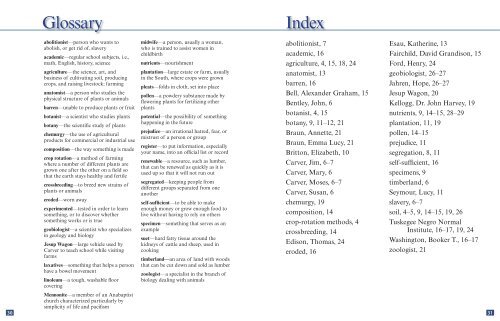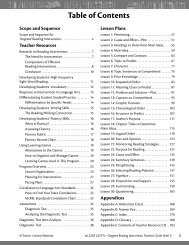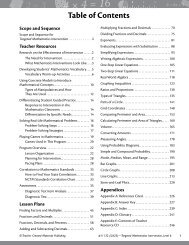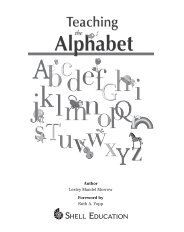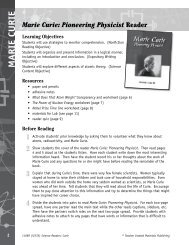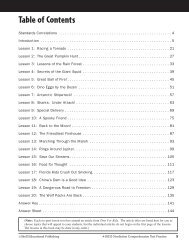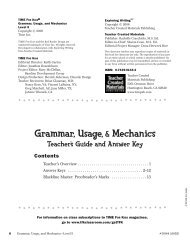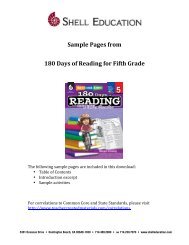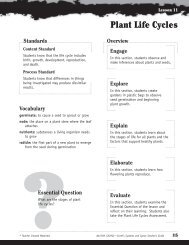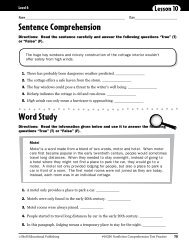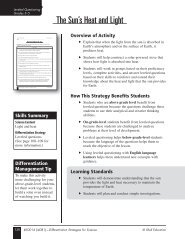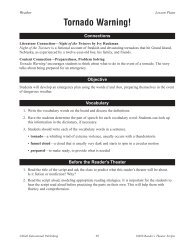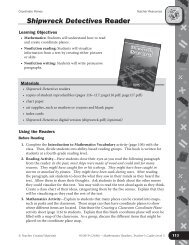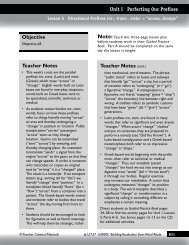George Washington Carver - Teacher Created Materials
George Washington Carver - Teacher Created Materials
George Washington Carver - Teacher Created Materials
Create successful ePaper yourself
Turn your PDF publications into a flip-book with our unique Google optimized e-Paper software.
Glossary<br />
Index<br />
abolitionist—person who wants to<br />
abolish, or get rid of, slavery<br />
academic—regular school subjects, i.e.,<br />
math, English, history, science<br />
agriculture—the science, art, and<br />
business of cultivating soil, producing<br />
crops, and raising livestock; farming<br />
anatomist—a person who studies the<br />
physical structure of plants or animals<br />
barren—unable to produce plants or fruit<br />
botanist—a scientist who studies plants<br />
botany—the scientific study of plants<br />
chemurgy—the use of agricultural<br />
products for commercial or industrial use<br />
composition—the way something is made<br />
crop rotation—a method of farming<br />
where a number of different plants are<br />
grown one after the other on a field so<br />
that the earth stays healthy and fertile<br />
crossbreeding—to breed new strains of<br />
plants or animals<br />
eroded—worn away<br />
experimented—tested in order to learn<br />
something, or to discover whether<br />
something works or is true<br />
geobiologist—a scientist who specializes<br />
in geology and biology<br />
Jesup Wagon—large vehicle used by<br />
<strong>Carver</strong> to teach school while visiting<br />
farms<br />
laxatives—something that helps a person<br />
have a bowel movement<br />
linoleum—a tough, washable floor<br />
covering<br />
Mennonite—a member of an Anabaptist<br />
church characterized particularly by<br />
simplicity of life and pacifism<br />
midwife—a person, usually a woman,<br />
who is trained to assist women in<br />
childbirth<br />
nutrients—nourishment<br />
plantation—large estate or farm, usually<br />
in the South, where crops were grown<br />
pleats—folds in cloth, set into place<br />
pollen—a powdery substance made by<br />
flowering plants for fertilizing other<br />
plants<br />
potential—the possibility of something<br />
happening in the future<br />
prejudice—an irrational hatred, fear, or<br />
mistrust of a person or group<br />
register—to put information, especially<br />
your name, into an official list or record<br />
renewable—a resource, such as lumber,<br />
that can be renewed as quickly as it is<br />
used up so that it will not run out<br />
segregated—keeping people from<br />
different groups separated from one<br />
another<br />
self-sufficient—to be able to make<br />
enough money or grow enough food to<br />
live without having to rely on others<br />
specimen—something that serves as an<br />
example<br />
suet—hard fatty tissue around the<br />
kidneys of cattle and sheep, used in<br />
cooking<br />
timberland—an area of land with woods<br />
that can be cut down and sold as lumber<br />
zoologist—a specialist in the branch of<br />
biology dealing with animals<br />
abolitionist, 7<br />
academic, 16<br />
agriculture, 4, 15, 18, 24<br />
anatomist, 13<br />
barren, 16<br />
Bell, Alexander Graham, 15<br />
Bentley, John, 6<br />
botanist, 4, 15<br />
botany, 9, 11–12, 21<br />
Braun, Annette, 21<br />
Braun, Emma Lucy, 21<br />
Britton, Elizabeth, 10<br />
<strong>Carver</strong>, Jim, 6–7<br />
<strong>Carver</strong>, Mary, 6<br />
<strong>Carver</strong>, Moses, 6–7<br />
<strong>Carver</strong>, Susan, 6<br />
chemurgy, 19<br />
composition, 14<br />
crop-rotation methods, 4<br />
crossbreeding, 14<br />
Edison, Thomas, 24<br />
eroded, 16<br />
Esau, Katherine, 13<br />
Fairchild, David Grandison, 15<br />
Ford, Henry, 24<br />
geobiologist, 26–27<br />
Jahren, Hope, 26–27<br />
Jesup Wagon, 20<br />
Kellogg, Dr. John Harvey, 19<br />
nutrients, 9, 14–15, 28–29<br />
plantation, 11, 19<br />
pollen, 14–15<br />
prejudice, 11<br />
segregation, 8, 11<br />
self-sufficient, 16<br />
specimens, 9<br />
timberland, 6<br />
Seymour, Lucy, 11<br />
slavery, 6–7<br />
soil, 4–5, 9, 14–15, 19, 26<br />
Tuskegee Negro Normal<br />
Institute, 16–17, 19, 24<br />
<strong>Washington</strong>, Booker T., 16–17<br />
zoologist, 21<br />
30 31


